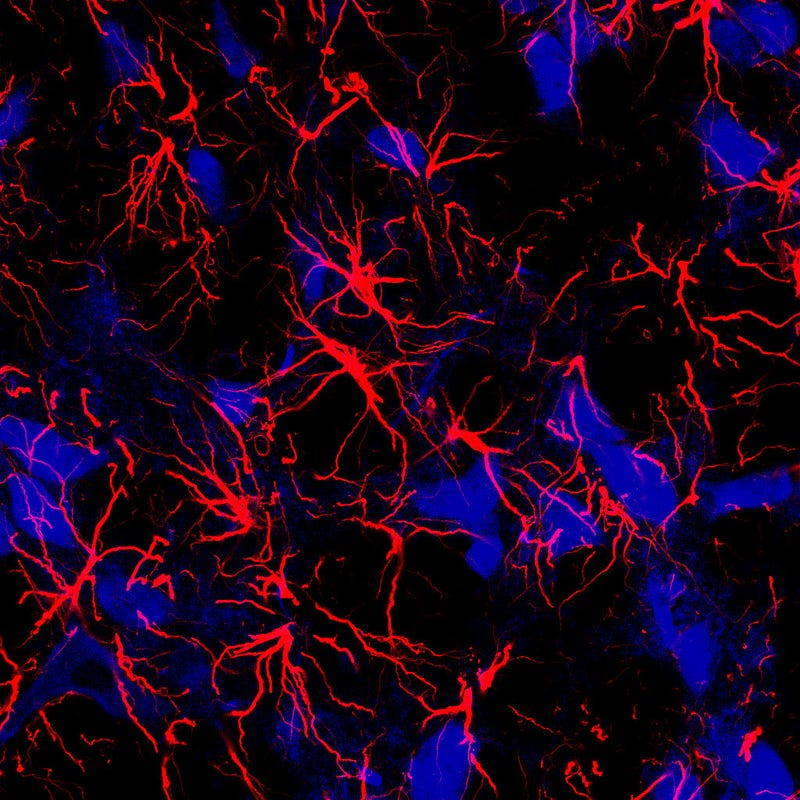Unlocking the Gut-Brain Connection: The Role of Microbiome
Written on
Chapter 1: The Unsung Heroes of the Brain
When we think of brain cells, we often picture neurons, the primary communicators that transmit electrical signals. However, these neuronal cells comprise less than half of the brain's cellular makeup. In fact, a significant population of star-shaped cells known as astrocytes exists alongside them. Astrocytes play a vital role in processing signals, storing energy, and responding to injuries in the brain.
Recent research has begun to unravel the intricate ways in which our gut microbiota communicate with the brain. While much of this work has focused on neuronal cells, astrocytes have been largely overlooked. A breakthrough came when scientists discovered that astrocytes are responsive to signals generated by gut bacteria. When we consume proteins, our bodies break them down into fundamental components, one of which is tryptophan. This amino acid serves as sustenance for gut microbes, which, after utilizing it for energy, produce by-products that can signal astrocytes in the brain.

Could the secret to regulating astrocytes reside in our gut? A compelling new study suggests that the microbiome may grant astrocytes the ability to eliminate harmful cells.
Section 1.1: The Fight Against Multiple Sclerosis
In conditions like multiple sclerosis, the body’s immune cells mistakenly target its own nerves. In these cases, astrocytes fail to perform their protective functions. They do not inhibit the influx of new immune cells into the brain or prevent resident immune cells from attacking neurons. Researchers identified a specific group of astrocytes in the spinal cord that contribute to this inflammatory response.
These astrocytes exhibited elevated levels of a protein that promotes cell destruction. When this protein is inhibited, the severity of the disease worsens in models of multiple sclerosis. This protein empowers astrocytes to signal circulating immune cells to undergo self-destruction, thereby reducing the autoimmune inflammatory response. Notably, this subset of astrocytes was found to be diminished in both experimental models and human patients suffering from multiple sclerosis.
Section 1.2: A New Ally in the Brain
Researchers discovered Natural Killer (NK) cells in proximity to astrocytes within the brain, which raised suspicions. These NK cells release a signaling molecule known as IFN-γ, prompting astrocytes to produce proteins responsible for targeting and eliminating other immune cells. Interestingly, gut microbes play a crucial role in training and preparing these NK cells. In fact, animals devoid of gut microbes exhibited a reduced presence of both NK cells and astrocytes. Subsequent experiments confirmed that NK cells can migrate to the brain from the gut.
Chapter 2: Implications for Future Therapies
So, how can we leverage this information? It is possible that specific microbes could enhance the training of NK cells, leading to an increased number of astrocytes capable of defending the brain. These astrocytes would be more effective in eliminating cells that trigger unnecessary inflammation. Dr. Francisco Quintana, the lead author on this research, highlighted the significance of these findings, stating:
“Identifying microbiome-regulated anti-inflammatory astrocyte subsets is a crucial step forward in our understanding of CNS inflammation and its regulation. This novel pathway illustrates how gut health can influence brain inflammation, potentially guiding new treatments for neurological disorders and contributing to the understanding of brain tumor pathogenesis.”
The first video titled "How to Enhance Your Gut Microbiome for Brain & Overall Health" explores strategies to improve gut health and its impact on brain function.
The second video, "Harnessing the Power of the Microbiota to Boost Immunity Against Infection and Cancer," discusses how gut bacteria can enhance the immune response to various diseases.
As we continue through 2021, numerous significant studies on the microbiome are already emerging. I previously covered human studies that reveal the influence of our genetic makeup on our microbial communities. I look forward to another year filled with groundbreaking discoveries, intriguing microbial phenomena, and advancements in neuroscience!
If you're interested in keeping up with my writings, be sure to check out my new Substack. I'll be highlighting fascinating scientific insights and curating a weekly compilation of my articles, covering some of the most intriguing (and sometimes bizarre) tales in science and culture!